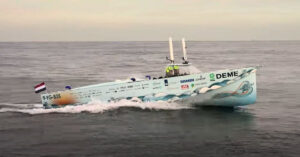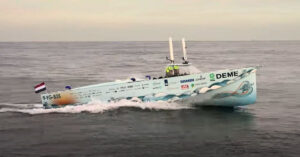
World’s First Fully Hydrogen-Powered Ferry Launched In San Francisco Bay
July 15, 2024
Environmental Group Sues U.S. Government Over Delayed Decommissioning Of Offshore Oil Infrastructure
July 15, 2024

In a historic accomplishment, Dutch students from the TU Delft Hydro Motion Team successfully crossed the North Sea from the Netherlands to England in a fully hydrogen-powered vessel.
The historic crossing, the first of its kind, was completed on July 11, 2024.
The team sailed from Breskens Harbor in the Netherlands to Ramsgate Royal Harbour in England, travelling roughly 169 kilometres on a single hydrogen tank.
The crossing was not without difficulties; their first attempt on July 9, 2024, was put on hold due to technological issues and poor weather forecasts.
Undeterred, the team regrouped and sailed again on July 11.
Video Credits: TU Delft Hydro Motion Team/YouTube
The team encountered another setback when a cooling pump failed at the start of their second attempt.
A quick halt at Zeebrugge harbour allowed the ground team to fix the defective pump, allowing the boat to resume its journey.
Despite minor technical issues along the way, the team was able to address them with assistance from their accompanying vessel and the pilots themselves.
The TU Delft Hydro Motion Team recognized for its prior success in the Monaco Energy Boat Challenge, where it was declared global champion, took on this new challenge with a focus on durability and reliability.

The boat was designed with a higher hull and a sharp bow to cut through the waves effectively.
They also installed an extra hydrogen tank, increasing the total capacity to 25 kilograms, sufficient for the entire journey.
The project faced substantial hurdles regarding jurisdiction, logistics, and safety.
The team established an internal unit to manage these aspects full-time, assuring strict protocols, additional training sessions, and rigorous preparations.

Weather conditions determined the exact timing of the crossing, with the crew designating the second week of July as their “weather window.”
The assistance of Frontier BV, which offered cutting-edge networking solutions, was vital to their success.
Upon their successful arrival in Ramsgate at 22:40 local time, the crew expressed their pride and gratitude for the project’s support.

They emphasized using only 12.3 kilograms of hydrogen for the 169.1-kilometer journey, demonstrating the efficiency and potential of hydrogen-powered maritime travel.
This accomplishment illustrates the practicality of hydrogen-powered vessels and contributes to the maritime industry’s pursuit of green energy alternatives.
The TU Delft Hydro Motion Team’s innovative spirit and commitment have set a new standard for sustainable maritime technology.
Reference: TU Delft Hydro Motion Team
TU Delft Students Make Historic Self-Built Fully Hydrogen Boat Crossing From Netherlands To England appeared first on Marine Insight – The Maritime Industry Guide
Source: Maritime Shipping News


